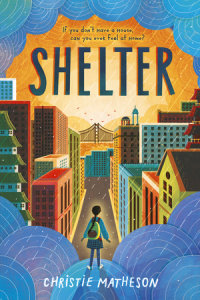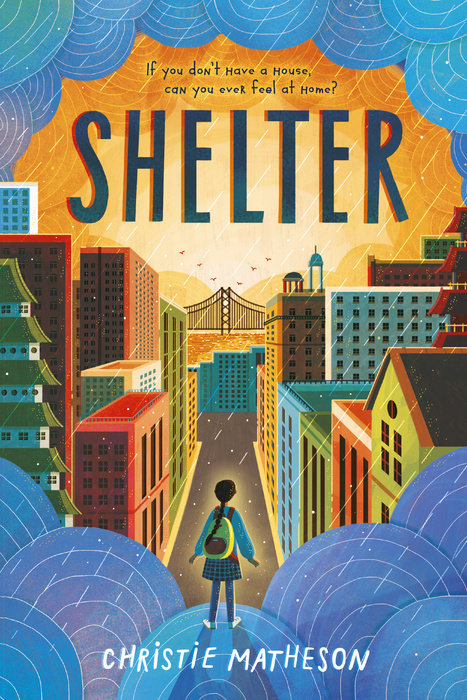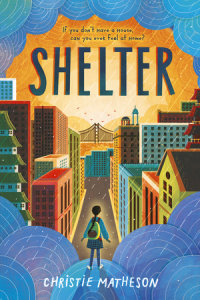6:32 a.m. I open my eyes. Through a small window, I see a hint of light in the winter morning sky. That tells me it’s time to wake up.
But I curl my legs tighter to my chest under my blanket. I didn’t sleep very well, partly because it was one of those nights when my feet never got all the way warm. Outside the blanket will be even chillier, and I’m not ready to leave the relative warmth of my little nest. I also have an ache in my stomach, and I can’t feel if it’s because I’m sad or because I’m anxious about everything that’s happening today. Probably both. It’s not easy to get out of bed when you have that waking-up ache.
Still, I know if I don’t get up now, I’ll be late to school. I don’t want to be late. It’s a Friday, and I have a ninety-minute art period today. Plus, as exhausting as school can be, at least being there feels almost normal. Unlike every other part of my life.
Slowly, I peel my blanket off, sit up, and glance out the window again. There’s no sign of rain, but I heard my PE teacher say yesterday that it’s going to pour today. As if today weren’t going to be hard enough already.
I swing my feet onto the floor. Yikes. It’s cold.
San Francisco, where I live, doesn’t get freezing the way some places do. But on wet winter days, it’s chilly. And this room, which never gets much sunlight and is heated by a system that only works some of the time, is especially cold.
I know that in many ways I’m lucky to live in San Francisco. It’s supposed to rain later, but the temperature should reach fifty degrees today. There are parts of Iowa and Minnesota where it will be negative fifty with the windchill factor.
I shiver in my pajamas, which are getting thin and are too short for me. I’ve had them since I was eight. I’m almost eleven now. They have pink and red hearts on them, which is perfect for February, and today is February 1. But I wear them all year long. They’ve been my favorites for a long time, and right now they’re the only pajamas I have. I take them off, shivering, and fold them so I can wear them again tonight.
As quietly as I can, I pull on navy blue leggings and a white shirt. The leggings have a hole in the left knee, and the shirt is stained in the front. No matter how hard I scrub it, that stain won’t come out. But when I pull my blue-and-white-plaid school uniform jumper over them, the hole and stain are barely noticeable. And at least my leggings and shirt are all the way dry this morning. Knowing how chilly and rainy today’s going to get, I do not want to start with a wet uniform. I wash my clothes every night, because if you wear anything that still smells like yesterday’s PE class, there are kids at my school who will definitely make fun of you for it.
A few days ago my clothes were still damp from being washed the night before, but I had to wear them anyway.
Like my heart pajamas, they’re the only ones I have.
I put on my white socks, which thankfully are also completely dry. They’re worn through at the heels, but they feel better than the bare floor, at least. I lace up my white school sneakers, which aren’t very white anymore.
The arms of my navy blue school sweatshirt are getting short, but I need something warmer than a short-sleeved shirt today, so I put it on. I brush my long hair and pull it into the tight braid Mama insists on, every single day. “We don’t need to deal with lice right now,” she reminds me if I ever try to skip the braid. She’s not kidding. I did get lice once. About ten girls at my school had it. It’s a pain to get rid of lice, and expensive to pay for treatment. Since then, my hair always goes into a braid for school.
I’m almost ready to make the journey across the city to my school, a private girls’ school about four miles away. Today I’ll have to ride two city buses to get there. I need to leave soon.
Mama and my little sister, Gabby, usually go with me on the ride to school, and when they do, we only take one bus. Except for yesterday. Mama and Gabby were with me, but we were practicing for today, when we knew I’d be making the trip to school alone. Because Mama has a job interview, finally, this morning. If she rides the bus to school with me, she might be late for it. And then she has to be at the hospital in the afternoon, so she can’t pick me up from school, either.
So I have to go by myself. Both ways. And probably in the rain, at least on the way home. I know it’s not fair for me to be mad at Mama about this. I’m trying not to be. But no one else at my school is going to have to do what I have to do today.
Mama doesn’t want me walking to the farther-away bus stop without her. Instead, I’ll go to the closer bus stop, but that means changing buses halfway through the trip. It also means the whole ride takes longer.
I check my backpack to make sure my homework folder is in there. Of course it is; I put it there last night and checked three times. Homework is due on Fridays, and I have never turned my homework in late. Not even after what happened to my dad. Not even with everything that’s been going on with Mama, Gabby, and me.
Plus, if you turn your homework folder in during homeroom on Friday morning, you get it back by Friday afternoon so you can take it home over the weekend to work on the next week’s homework. That gives me something to do over the weekend, and it usually feels good to read my teachers’ comments on my work from the previous week.
With my backpack on, I lean over the cot where Mama is sleeping with Gabby. It’s close to the mattress on the floor where I slept. So far I’ve managed not to wake them up, even though I’ve been getting dressed about three feet away from them.
Mama and Gabby usually wake up earlier than I do. My sister had a hard time falling asleep last night, though, and even after she fell asleep, she tossed and turned and cried out a lot. Then a loud noise from outside woke her up, and she had trouble falling asleep all over again. Which means Mama and I didn’t sleep very well, either, but we can handle it better than a two-and-a-half-year-old can.
So I know Gabby should probably sleep as long as possible this morning. But I need to wake up Mama now, to tell her I’m leaving for school, and to make sure she’s up in time to get ready for her day. She can’t be late to her interview.
Usually the first thing I do when I see Mama in the morning is kiss her. If I ever have to wake her up, I kiss her forehead. But I’m still kind of mad at her. So I just tap her cheek. Nothing. I tap it again. She groans in her sleep, and then her eyes flutter open. When she sees me, she smiles.
“Good morning, my Maya,” she whispers. At the sound of her voice, some of my anger melts away.
“Good morning, my Mama,” I whisper back.
Then I kiss my little sister on the forehead and whisper, ever so quietly, “Good morning to you, Gabby girl.”
I leave it to Mama to wake her up, because Gabby is sure to be grumpy after such a tough night. “I’m leaving for school now, Mama,” I whisper.
When I say that, Mama’s eyes open wide and she sits up. She puts her hand on my cheek.
“Oh, my Maya,” she whispers, and I think I see tears in her eyes.
I know she wishes she could take me to school today, like she does every other day. I think she really wishes she could just walk me to school, like she used to. “Look at you, all ready to go. I’m sorry I didn’t wake up first.”
“It’s okay,” I whisper. “Last night was hard.”
We both glance at Gabby, who is now finally sleeping deeply. Mama reaches over and strokes Gabby’s head softly. Then she looks back at me.
“Do you remember exactly how to do the buses today?” Mama asks.
“I do. I remember. It’s fine, Mama,” I say, the ache swelling in my stomach and some of my anger coming back. I try to sound confident, even though I’m nervous. But people, even kids my age, take the bus by themselves all the time. It will be fine. It just doesn’t feel fine right now.
“Did you take a banana?” she asks.
“I will,” I say, glancing at the two remaining bananas on the shelf near the door. I decide I actually won’t take one, so Mama and Gabby will have something to eat.
“You are amazing, my love. I’m so sorry I can’t take you today. I’ll see you here after you take the bus back from school. Have a beautiful day, my Maya.” I can feel more of my anger melting away.
“I will, my Mama. You too. Good luck,” I whisper. “And tell Daddy I love him.”
“I will,” she whispers back. “Thank you.”
I pause near the bananas, to make her think I’m grabbing one, and I notice there are three left, not two. I leave them all. My school lunch will come soon enough, and Gabby gets hungry in the morning. She can have two bananas if she wants.
I’m not really mad at Mama. I’m definitely not mad at Gabby. I’m just sad and scared.
So I turn and blow a kiss toward them. Then I quietly open the door of our room, close and lock it behind me, and walk down the hall of our homeless shelter.
1
Go Time
Start where you are.
—Arthur Ashe
6:56 a.m. There’s a clock near the front door of the shelter, and I realize it’s not quite seven a.m. Mama doesn’t like us to leave the shelter before seven. She thinks there are more people around outside after seven. She’s probably right, although I’m not sure four minutes makes a big difference.
While I wait, and brace myself for the trip to school that I’ve been dreading, I look around. We’ve been living here for exactly one month. Although it feels like much longer than that. When every day is long and hard, time feels different. A month can feel like forever.
Anyway, it is a homeless shelter, but no one who works here calls it that. They call it a family shelter, which I guess they think sounds nicer. There are lots of different kinds of shelters, I’ve learned. Some are just for grown-ups, some are for men only, some are for women only, some are for kids who’ve run away from home, and some are only for families with kids. Some are transitional housing shelters, where you can stay for more than a year. Some shelters have private rooms, and some have a bunch of beds in one big room. Some let you stay for a while and leave your stuff there, and some you can use only at night—you have to leave during the day and you might or might not get a bed the next night.
We had to stay at one of those one-night-at-a-time shelters, for one night, before we moved in here.
But even if you add up all the beds and all the rooms, there aren’t enough shelters for the thousands of homeless people in San Francisco. There are waiting lists, and there are a lot of people who sleep in their cars or outside.
Here we have our own room and even our own bathroom with a sink and a toilet. And there’s a shared bathroom where we can take showers sometimes. We can stay for up to six months. I know we’re lucky to have our own space. But I don’t want to be here for that long. I also don’t know where we’ll go next, if Mama doesn’t have a job by then.
I didn’t think much about shelters before we had to move into one. I mean, I knew a little about them. Every year at school we talk about homelessness, hunger, and food insecurity—that’s when someone doesn’t always have enough food—in San Francisco. Our class also goes to work at a local food pantry one afternoon during each school year, to help with food distribution. That food pantry is at a community center in a neighborhood called the Richmond.
The Richmond isn’t one of the San Francisco neighborhoods you see on postcards. It’s far away from the steep cable car hills, crooked Lombard Street, and the sea lions at Pier 39.
The Richmond is bordered by some fancy neighborhoods, Golden Gate Park, and the Presidio, which is a national park with hiking trails. But basically it’s just a normal neighborhood.
Some streets have nice houses, and some blocks have run-down apartment buildings. It’s safe, for a city neighborhood.
It’s where my family used to live.
When we volunteered at the shelter, we learned that twenty-five percent of people who live in the Richmond are at high risk for food insecurity.
And now my family is, too.


